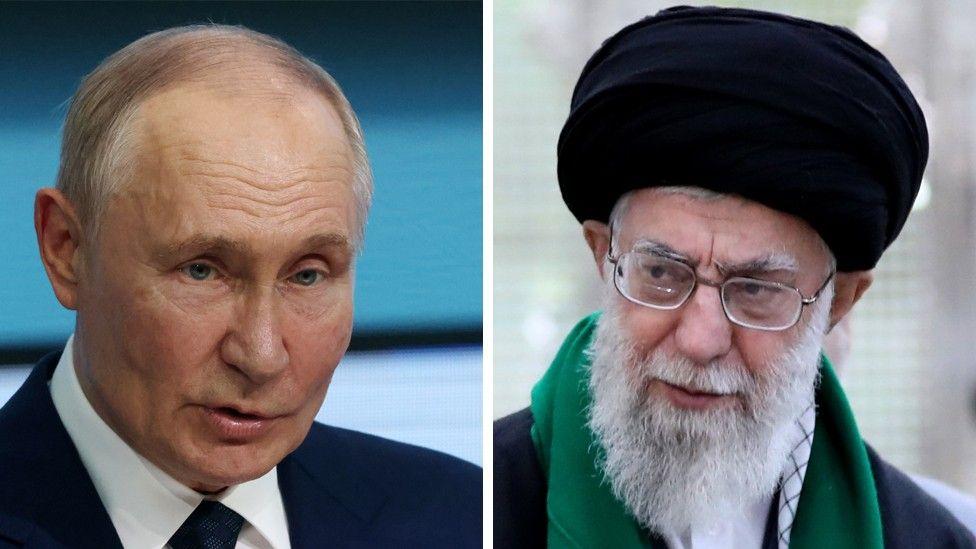Russian intelligence has been on a mission to cause “sustained chaos on the British and European streets”, the head of MI5 has said.
In his annual update on the security threats facing Britain, Ken McCallum said GRU officers had carried out “arson, sabotage and more dangerous actions with increasing recklessness” in Britain after Britain backed Ukraine in its war with Russia .
MI5 had also responded to 20 plots backed by Iran since 2022, he said, although he added that the majority of its work was still primarily on Islamist extremism, followed by far-right terrorism.
The complex mix of terror-related and nation-state threats meant MI5 had “a huge job on its hands”, he warned.
In an extended speechhe said:
-
Young people were increasingly involved in online extremism, with 13% of those investigated for involvement in terrorism being under the age of 18
-
Since 2017, a total of 43 late-stage plots involving firearms and explosives to commit ‘mass murder’ have been foiled in Britain.
-
The number of state threat investigations by MI5 had increased by 48%
-
Counter-terrorism work remained divided between “75% Islamist extremism and 25% far-right terrorism”.
There was a “staggering range of beliefs and ideologies” that MI5 had to deal with, he told the briefing at MI5’s counter-terrorism center in London.
‘The first twenty years of my career here were full of terrorist threats.
“We are now confronted with state-sponsored assassination and sabotage plans, against the backdrop of a major European land war,” he said.
Britain’s “leading role” in supporting Ukraine means that “we loom in the feverish imagination of Putin’s regime” and further acts of aggression on British soil are to be expected, he warned.
That of Great Britain The current terrorist threat level is substantial – meaning an attack is likely.
More than 750 Russian diplomats have been expelled from Europe since Russia’s invasion of Ukraine, “the vast majority of them” spies, McCallum said.
This affected the capacity of Russia’s intelligence services, he explained, adding that diplomatic visas had been denied to those Britain and its allies considered Russian spies.
Russian state actors turned to proxies, such as private intelligence agents and criminals, to do “their dirty work”, but this eroded the professionalism of their operations and made them easier to disrupt.
Although Mr. McCallum has previously spoken publicly about both Russian and Iranian threats, he has not previously accused Moscow in such stark terms.
In an earlier public speech he referred to ten plots against Iranians in Britain. That number has now doubled, implying that the Iranian state’s activities are undeterred by the threat of capture.
“Since the assassination of Mahsa Amini in 2022, we have seen plot after plot here in Britain, at an unprecedented pace and on an unprecedented scale,” McCallum said.
He added that as the war in the Middle East continues, MI5 would give its “full attention to the risk of an increase – or a broadening – of Iranian state aggression in Britain”.
In both cases, Russia and Iran, the MI5 boss emphasized that because it was difficult to almost impossible for their accredited diplomats to carry out such actions, they increasingly turned to criminal underworld gangs.
On China, he said the Chinese Communist Party (CCP) had a program to steal data and information from Britain and that “we have seen 20,000 veiled approaches to individuals by China.”
‘A good understanding of online culture’
The number of young people becoming involved in online extremism is growing, McCallum warned.
About 13% of those investigated for involvement in terrorism were under the age of 18 – a threefold increase in the past three years.
The security service saw “far too many cases of very young people becoming involved in toxic online extremism”.
“Far-right terrorism in particular strongly targets young people, driven by propaganda that demonstrates a keen understanding of online culture,” he said.
In response to reporters’ questions, he reiterated his concerns about the role of the Internet as the “biggest factor” driving this trend, describing how easily young people could access material from their bedrooms.
Much of the threat was caused by “lonely individuals who have been indoctrinated online,” he said.
“In the dark corners of the internet, talk is cheap. It is a demanding task to distinguish the real conspirators from lazy extremists,” he said.
“Anonymous online connections are often insignificant, but a minority leads to deadly, real actions.”
Home Office figures published last month show that of the 242 people detained on suspicion of terror offenses in the year to June, 17% (40) were aged 17 or younger.
Sir Keir Starmer acknowledged McCallum’s “sober findings” but said the public “needs to be reassured that our security services are world-class and will do whatever it takes to keep us safe.”







